PEP六年级英语上册第三单元知识点
pep人教版六年级上册英语各单元知识点
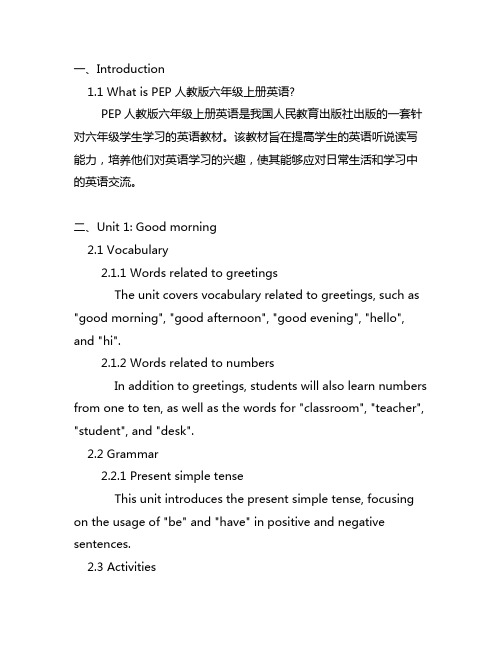
一、Introduction1.1 What is PEP人教版六年级上册英语?PEP人教版六年级上册英语是我国人民教育出版社出版的一套针对六年级学生学习的英语教材。
该教材旨在提高学生的英语听说读写能力,培养他们对英语学习的兴趣,使其能够应对日常生活和学习中的英语交流。
二、Unit 1: Good morning2.1 Vocabulary2.1.1 Words related to greetingsThe unit covers vocabulary related to greetings, such as "good morning", "good afternoon", "good evening", "hello", and "hi".2.1.2 Words related to numbersIn addition to greetings, students will also learn numbers from one to ten, as well as the words for "classroom", "teacher", "student", and "desk".2.2 Grammar2.2.1 Present simple tenseThis unit introduces the present simple tense, focusing on the usage of "be" and "have" in positive and negative sentences.2.3 Activities2.3.1 Role-playingTo practice the new vocabulary and grammar, students can engage in role-playing activities, where they take on the roles of greeting each other and asking basic questions in English.三、Unit 2: I can run3.1 Vocabulary3.1.1 Words related to sports and activitiesIn this unit, students will learn vocabulary related to sports and activities, including "run", "jump", "swim", "dance", "sing", "draw", and "read".3.1.2 Words related to expressing abilityAlong with sports vocabulary, students will also be introduced to words and phrases for expressing ability, such as "can" and "can't".3.2 Grammar3.2.1 Can and can'tThe grammar focus of this unit is on the usage of "can" and "can't" to express one's ability or inability to do something.四、Unit 3: At the zoo4.1 Vocabulary4.1.1 Words related to animalsThis unit covers vocabulary related to animals, such as "elephant", "panda", "tiger", "lion", "zebra", "giraffe", and "kangaroo".4.1.2 Words related to colorsStudents will also learn words for different colors, as many animals' physical characteristics are associated with specific colors.4.2 Grammar4.2.1 There is and there areThe grammar point of this unit is on the usage of "there is" and "there are" to talk about the existence of animals and objects at the zoo.4.3 Activities4.3.1 Describing animalsTo practice the new vocabulary and grammar, students can engage in activities where they describe different animals at the zoo using the words and phrases they have learned.五、Unit 4: Our classroom5.1 Vocabulary5.1.1 Words related to classroom objectsThis unit introduces vocabulary related to classroomobjects, such as "blackboard", "book", "pen", "pencil", "ruler", "desk", and "chair".5.1.2 Words related to prepositionsAlong with classroom objects, students will also learn prepositions such as "on", "in", "under", "behind", and "next to".5.2 Grammar5.2.1 Prepositions of placeThe grammar focus of this unit is on the usage of prepositions of place to describe the location of objects within the classroom.5.3 Activities5.3.1 Classroom scavenger huntTo reinforce the new vocabulary and grammar, students can participate in a classroom scavenger hunt, where they use prepositions to describe the location of different objects in the classroom.六、Unit 5: My school day6.1 Vocabulary6.1.1 Words related to school subjectsThis unit covers vocabulary related to school subjects, such as "Chinese", "math", "English", "music", "PE", "art", and puter".6.1.2 Words related to timeAlong with school subjects, students will also learn words and phrases related to time, such as "morning", "break", "lunch", "afternoon", and "evening".6.2 Grammar6.2.1 Present continuous tenseThe grammar focus of this unit is on the usage of the present continuous tense to talk about activities happening at the present moment.6.3 Activities6.3.1 Creating a daily scheduleTo practice the new vocabulary and grammar, students can create a daily schedule, using school subjects and time-related words to describe their typical school day.七、ConclusionThe PEP人教版六年级上册英语教材 covers a wide range of vocabulary, grammar, and activities that aim to provide students with a solid foundation in English language learning. By introducing topics such as greetings, sports, animals, classroom objects, and school subjects, the textbook offers students opportunities to engage in meaningful language use and develop essential language skills. With its systematicandprehensive approach to language learning, PEP人教版六年级上册英语 helps students cultivate their interest in English and facilitates their language acquisition process.。
新人教版PEP小学英语六年级上册各单元知识点总结
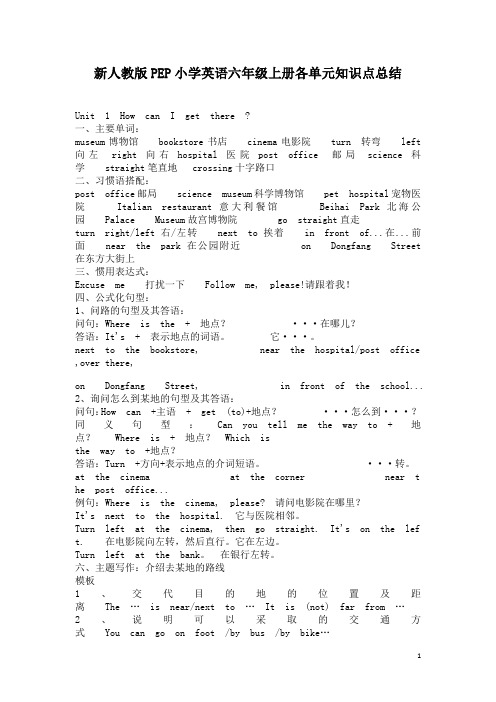
新人教版PEP小学英语六年级上册各单元知识点总结Unit 1 How can I get there ?一、主要单词:museum博物馆bookstore书店cinema电影院turn 转弯left 向左right向右hospital医院post office 邮局science科学straight笔直地 crossing十字路口二、习惯语搭配:post office邮局science museum科学博物馆pet hospital宠物医院Italian restaurant意大利餐馆Beihai Park北海公园Palace Museum故宫博物院go straight直走turn right/left右/左转next to挨着in front of...在...前面near the park在公园附近on Dongfang Street 在东方大街上三、惯用表达式:Excuse me 打扰一下Follow me, please!请跟着我!四、公式化句型:1、问路的句型及其答语:问句:Where is the + 地点?···在哪儿?答语:It's + 表示地点的词语。
它···。
next to the bookstore, near the hospital/post office ,over there,on Dongfang Street, in front of the school...2、询问怎么到某地的句型及其答语:问句:How can +主语+ get (to)+地点?···怎么到···?同义句型:Can you tell me the way to +地点?Where is + 地点?Which isthe way to +地点?答语:Turn +方向+表示地点的介词短语。
人教版PEP小学英语六年级上册Unit3名师讲解+课文单词+知识点梳理+单元练习
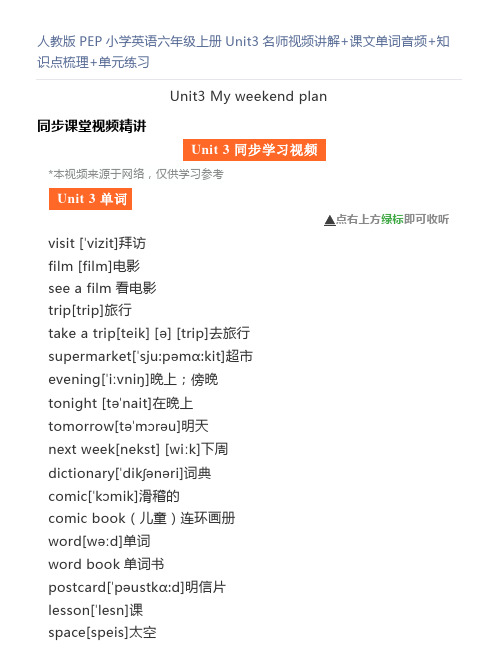
人教版PEP小学英语六年级上册Unit3名师视频讲解+课文单词音频+知识点梳理+单元练习Unit3 My weekend plan同步课堂视频精讲*本视频来源于网络,仅供学习参考▲点右上方绿标即可收听visit [ˈvizit]拜访film [film]电影see a film看电影trip[trip]旅行take a trip[teik] [ə] [trip]去旅行supermarket[ˈsju:pəmɑ:kit]超市evening[ˈiːvniŋ]晚上;傍晚tonight [təˈnait]在晚上tomorrow[təˈmɔrəu]明天next week[nekst] [wiːk]下周dictionary[ˈdikʃənəri]词典comic[ˈkɔmik]滑稽的comic book(儿童)连环画册word[wəːd]单词word book单词书postcard[ˈpəustkɑ:d]明信片lesson[ˈlesn]课space[speis]太空travel[ˈtrævl](尤指长途)旅行h alf[hælf]一半price[prais]价格Mid-Autumn Festival[mid] [ˈɔːtəm] [ˈfestəvəl]中秋节mid[mid]中央的; 中间的autumn[ˈɔːtəm]秋天festival[ˈfestəvəl]节日together[təˈɡeðə]一起get together聚会mooncake[muːnkeik]月饼poem[ˈpəuim]诗moon[muːn]月亮▲点右上方绿标即可收听Unit 3 My weekend plan 我的周末计划What are you going to do in the nature park? 你要在自然公园做什么?I'm going to draw some pictures. 我要去画画。
人教版PEP 英语六年级上册 全册各单元知识点总结
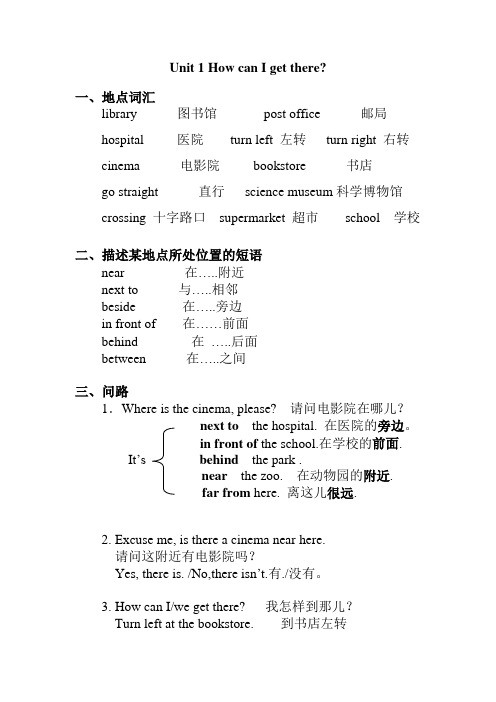
Unit 1 How can I get there?一、地点词汇library 图书馆post office 邮局hospital 医院turn left 左转turn right 右转cinema 电影院bookstore 书店go straight 直行science museum科学博物馆crossing 十字路口supermarket 超市school 学校二、描述某地点所处位置的短语near 在…..附近next to 与…..相邻beside 在…..旁边in front of 在……前面behind 在…..后面between 在…..之间三、问路1.Where is the cinema, please? 请问电影院在哪儿?next to the hospital. 在医院的旁边。
in front of the school.在学校的前面.It’s behind the park .near the zoo. 在动物园的附近.far from here. 离这儿很远.2. Excuse me, is there a cinema near here.请问这附近有电影院吗?Yes, there is. /No,there isn’t.有./没有。
3. How can I/we get there? 我怎样到那儿?Turn left at the bookstore. 到书店左转4. How can I get to the hospital? 我该怎样到达医院呢?Take the No.57 bus. 乘坐第57路公汽。
By the No. 57 bus.注意:到那儿get there到某地get to Canada/Australia/Beijing/ Shanghai/Wuhanget to the hospital/zoo/bookstore四、指引路1.You can take the No.32 bus.你可乘坐312路公交车去那儿.注意:You can go by the No.32 bus.与上句意思一样,只是说法不同。
pep六年级英语上册Unit 3知识点总结
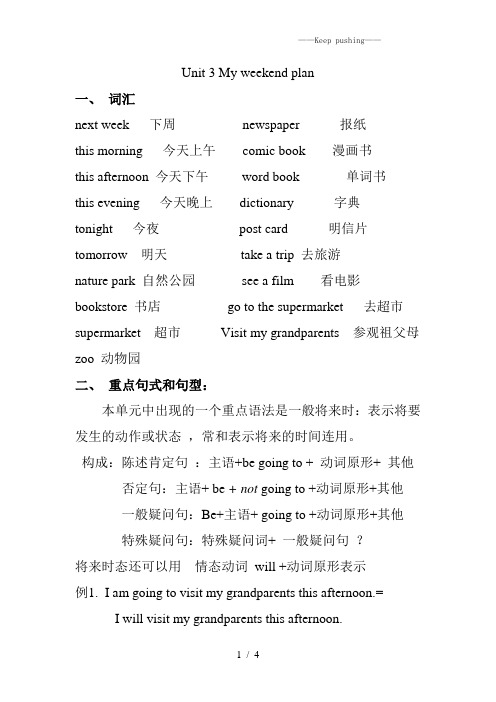
Unit 3 My weekend plan一、词汇next week 下周newspaper 报纸this morning 今天上午comic book 漫画书this afternoon 今天下午word book 单词书this evening 今天晚上dictionary 字典tonight 今夜post card 明信片tomorrow 明天take a trip 去旅游nature park 自然公园see a film 看电影bookstore 书店go to the supermarket 去超市supermarket 超市Visit my grandparents 参观祖父母zoo 动物园二、重点句式和句型:本单元中出现的一个重点语法是一般将来时:表示将要发生的动作或状态,常和表示将来的时间连用。
构成:陈述肯定句:主语+be going to + 动词原形+ 其他否定句:主语+ be + not going to +动词原形+其他一般疑问句:Be+主语+ going to +动词原形+其他特殊疑问句:特殊疑问词+ 一般疑问句?将来时态还可以用情态动词will +动词原形表示例1.I am going to visit my grandparents this afternoon.=I will visit my grandparents this afternoon.2. I am not going to visit my grandparents this afternoon.=I won’t visit my grandparents this afternoon.3. Are you going to visit your grandparents?Yes,I am. /No, I am not.4.Will you visit your grandparents?Yes,I will. / No, I won’t.注意:won’t = will not5.What(什么)are you going to do tomorrowI am going to have an art lesson.Where(哪儿)are you going?We are going to the bookstore.When(什么时候)are you going?I’m going next Sunday./at3:00/tomorrow/this morning.How(怎样)are you going?I am going by bus/on foot.I am going to take a bus.Who (谁)are you going with?I am going with my mother/sister/friend.三、重点句型:1. 常用表达法:What are you going to do tomorrow?你明天打算做什么?I’m going to have an art lesson.我要去上美术课。
Unit 3 (知识清单)六年级英语上册(人教PEP版)
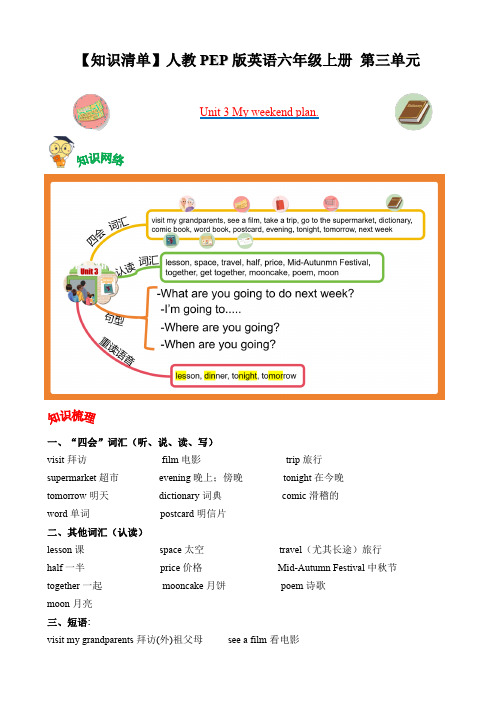
【知识清单】人教PEP版英语六年级上册第三单元Unit 3 My weekend plan.一、“四会”词汇(听、说、读、写)visit拜访film电影trip旅行supermarket超市evening晚上;傍晚tonight在今晚tomorrow明天dictionary词典comic滑稽的word单词postcard明信片二、其他词汇(认读)lesson课space太空travel(尤其长途)旅行half一半price价格Mid-Autumn Festival中秋节together一起mooncake月饼poem诗歌moon月亮三、短语:visit my grandparents拜访(外)祖父母see a film看电影take a trip去旅行go to the supermarket去超市this morning今天上午this afternoon今天下午this evening今天晚上next week下周comic book(儿童的)连环画册word book单词书get together聚会四、句型1.What are you going to do tomorrow?你明天打算做什么?2. I’m going to see a film.我打算看个电影。
3. We’re going to draw some pictures in Renmin Park.我们要到人民公园去画画。
4.Where are you going?你们打算去哪儿?5.We’re going to the cinema.我们打算去电影院。
6.When are you going?你们什么时候去?7.I have to do my homework now. 我现在不得不要做作业了。
8.Why not go on Tuesday?为什么不周二去呢?9.I have lots of comic books about space.我有许多关于太空的漫画书。
最新PEP人教版英语六年级上册第三单元知识总结
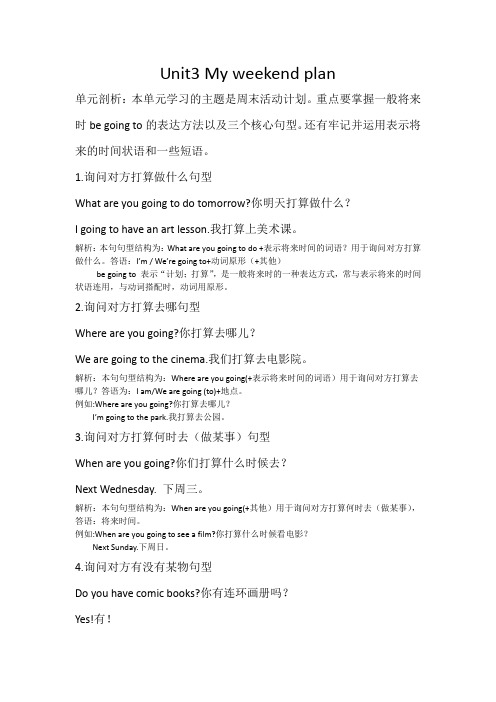
Unit3 My weekend plan单元剖析:本单元学习的主题是周末活动计划。
重点要掌握一般将来时be going to的表达方法以及三个核心句型。
还有牢记并运用表示将来的时间状语和一些短语。
1.询问对方打算做什么句型What are you going to do tomorrow?你明天打算做什么?I going to have an art lesson.我打算上美术课。
解析:本句句型结构为:What are you going to do +表示将来时间的词语?用于询问对方打算做什么。
答语:I’m / We’re going to+动词原形(+其他)be going to 表示“计划;打算”,是一般将来时的一种表达方式,常与表示将来的时间状语连用,与动词搭配时,动词用原形。
2.询问对方打算去哪句型Where are you going?你打算去哪儿?We are going to the cinema.我们打算去电影院。
解析:本句句型结构为:Where are you going(+表示将来时间的词语)用于询问对方打算去哪儿?答语为:I am/We are going (to)+地点。
例如:Where are you going?你打算去哪儿?I’m going to the park.我打算去公园。
3.询问对方打算何时去(做某事)句型When are you going?你们打算什么时候去?Next Wednesday. 下周三。
解析:本句句型结构为:When are you going(+其他)用于询问对方打算何时去(做某事),答语:将来时间。
例如:When are you going to see a film?你打算什么时候看电影?Next Sunday.下周日。
4.询问对方有没有某物句型Do you have comic books?你有连环画册吗?Yes!有!解析:本句句型结构为:Do you have +某物?用于询问对方有没有某物,do在这里是助动词无任何词义,have在这里意为“有,拥有”。
新pep版六年级上册英语第三单元复习课课件ppt
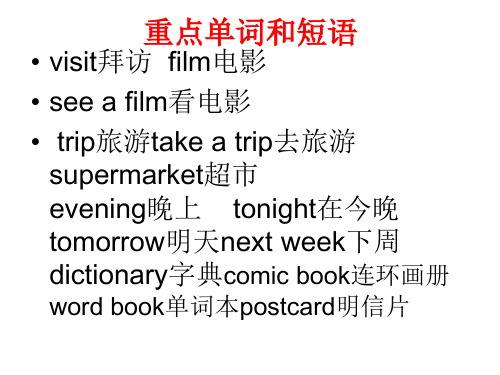
在整堂课的教学中,刘教师总是让学 生带着 问题来 学习, 而问题 的设置 具有一 定的梯 度,由 浅入深 ,所提 出的问 题也很 明确
按要求写单词
• look for (同义词) find • leaf (复数) leaves
• picture (复数) pictures • buy (反义词) sell
English book.
• A. Do you have comic book? B. What are you going to buy?C. This afternoon.
• ( B) 3.--Are you going to buy__
books?--Yes. I want to buy comic books.
• We are going to draw some pictures in Renmin Park.
Where are you going?---We’re going to the cinema.
When are you going?---Next Monday.
在整堂课的教学中,刘教师总是让学 生带着 问题来 学习, 而问题 的设置 具有一 定的梯 度,由 浅入深 ,所提 出的问 题也很 明确
• A. some, any B. any, some C. any, any D. some, some
在整堂课的教学中,刘教师总是让学 生带着 问题来 学习, 而问题 的设置 具有一 定的梯 度,由 浅入深 ,所提 出的问 题也很 明确
• ( B )4. Where are you going this afternoon?
三.单项选择。
- 1、下载文档前请自行甄别文档内容的完整性,平台不提供额外的编辑、内容补充、找答案等附加服务。
- 2、"仅部分预览"的文档,不可在线预览部分如存在完整性等问题,可反馈申请退款(可完整预览的文档不适用该条件!)。
- 3、如文档侵犯您的权益,请联系客服反馈,我们会尽快为您处理(人工客服工作时间:9:00-18:30)。
PEP六年级英语上册第三单元知识点
教师:学生:时间: 年月日段一、授课目的与考点分析:二、授课内容: Unit 3 What are you going to do ?
一、主要单词和词组: this morning 今天上午 this afternoon今天下午 this evening 今天晚上 next week 下周 tomorrow 明天tonight 今晚 post card 明信片 comic book漫画书 newspaper报纸 go to the cinema read a magazine else其他,另外二、主要句子: 1、What are you going to do on the weekend?你周末打算做什么?I’m going t o visit my grandparents this weekend?
这个周末我打算去看望我的外祖父母。
2、Where are you going this afternoon? 你今天下午打算去哪里?I’m going to the bookstore.我打算去书店。
3、What are you going to buy?你打算去买什么?I’m going to buy a comic book。
我打算去买一本漫画书。
4、What else?还有别的事吗?三、知识点: 1、What are you going to do?你想做什么?询问他人在未来的打算。
Be going to 后面要跟动词的原形。
2、this evening 和 tonight的区别: this evening指的是今天晚上睡觉以前的时间,一般指晚上十二点以前。
而tonight 指的是今晚,一般是指一整晚的时间,通宵。
3、特殊疑问句 1)、结构:特殊疑问词+一般疑问句的形式(一般情况下)例:Which do you like better? 特例:what happened to the other people on the plane? 2)、特殊疑问词的分类:疑问代词:what;who;which;whom 疑问形容词:what+名词;which+名词;whose+名词疑问副词:when ;where; why; how 3)、疑问代词的用法:(1)What “什么”用来问是什么,做什么,叫什么,什么样,询问职业等等。
例:What is your name? 你的名字叫什么? What is your father? 你爸爸是干什么的?(询问职业)=What does your father do ? What is your hobby?你的爱好是什么? What is your favourite food?你最喜爱的食物是什么? What’s your math teacher like? 你的数学老师长得什么样子? What is the date today?今天几月几号?It is May 1st. (2)who“谁”用来问人物是谁。
例:Who is your English teacher ?你的英语老师是谁?Who’s that man? 那个男人是谁?
(3)which“哪种、哪一个” 例:Which do you like better? 4)、疑问形容词的用法:(1)what time “几点了”用来问具体的时间,如:What time is it? 现在几点了?(2)What colour”什么颜色”用来问物体的颜色。
如:What colour is your schoolbag?你的书包是什么颜色的?(3)What kind of “什么种类”用来问类别。
如:What kind of fruit do you like?你最喜欢哪一种水果? (4)what day“什么日子”用来询问周几。
如:What day is it?今天周几? It is Sunday. (5) whose+名词“谁的”用来问物体的主人是谁如:Whose pencil is this? 这是谁的铅笔? Whose bike is blue? 谁的自行车是蓝色的? (6) which+名词“哪一个”用来问具体的哪一个。
如:Which season do you like best?你最喜欢哪个季节? Which pencil is ken’s? the long one or the sho rt one? 哪只铅笔是Ken的?长的那支还是短的那支? Which class are you in ?你在哪个班? 5)、疑问副词的用法:(1)Where “在哪里,到哪里”用来问地点。
例:Where are you from?你从哪里来? Where are you going to ?你打算去哪里? Where is my ruler?我的尺子在哪里?
(2)When“什么时候”用来问时间。
例:When is your birthday? 你的生日是什么时候? When are you going to ?你打算什么时候去?When do you go to school?你什么时候去上学?(3)why“为什么”用来问原因,一般要用because来回答。
如:why do you like spring?你为什么喜欢春天? Because I can fly kites.国为我可以放风筝。
(4)how“怎样”“如何做某事”用来问身体健康状况,或者事情的状况,对事件的看法等。
如:How are you?你(身体)好吗? How is your mother? 你妈妈(身体)好吗? How is the weather today?今天天气怎么样?=What is the weather like today? How do you do ?(初次见面)您好 (5)how many+名词复数“多少个”用来问有多少个,后面要跟名词的复数形式。
如:How many books do you have?你有多少本书? How many kites can you see? 你能看见多少只风筝?(6) how much “多少钱”用来问物体的价钱。
如:How much are they? 他们多少钱? How much is your schoolbag? 你的书包多少钱?(7)how old “几岁了”用来问年龄。
如:How old are you ?
你几岁了? How old is your father? 你爸爸多大了? (8) how long “多长” 如:How long is the Yellow River? (9)how tall “多高”:如:How tall is he ?他多高?(10)how about+n./ving“怎么样”表建议、请求如:What about you? 4、I want to be…我想成为… 表示理想。
相当于I’m going to be …. 例:I want to be a teacher. 5、在哪个门用介词at, at the north/east/south/west gate. 6、一般将来时(语法) 1)构成:be(am/is/are) going to+动词原形或 will+动词原形例:I am going to the bookstore by bus this afternoon. 2)用法:表示将要发生的动作或状态。
常与tomorrow,next week,in a few days,next Sunday连用例:I am going to have a busy weekend. I will leave Shandong tomorrow.
三、本次课后作业:习题四、学生对于本次课的评价:○ 特别满意○ 满意○ 一般○ 差
五、教师评定: 1、学生上次作业评价:○ 好○ 较好○ 一般○ 差 2、学生本次上课情况评价:○ 好○ 较好○ 一般○ 差学生签字: ___________ 清大学习吧教务处签字:___________。
